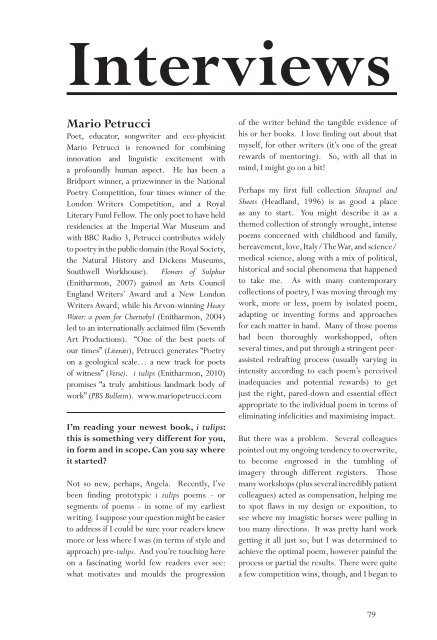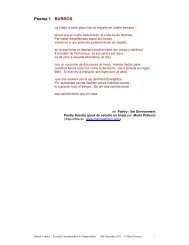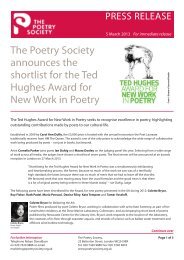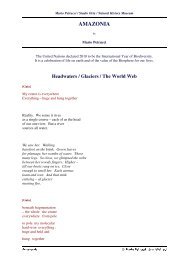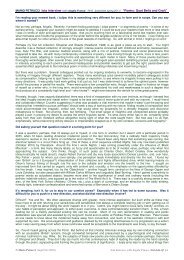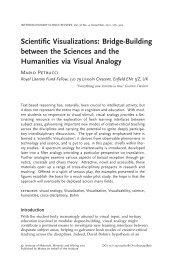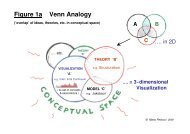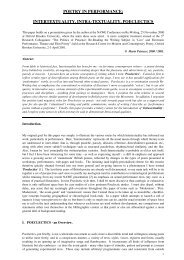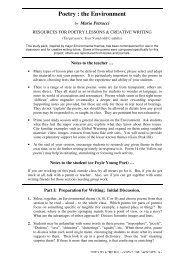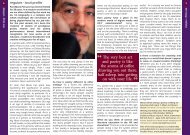Interviews - Mario Petrucci
Interviews - Mario Petrucci
Interviews - Mario Petrucci
Create successful ePaper yourself
Turn your PDF publications into a flip-book with our unique Google optimized e-Paper software.
<strong>Interviews</strong><br />
<strong>Mario</strong> <strong>Petrucci</strong><br />
Poet, educator, songwriter and eco-physicist<br />
<strong>Mario</strong> <strong>Petrucci</strong> is renowned for combining<br />
innovation and linguistic excitement with<br />
a profoundly human aspect. He has been a<br />
Bridport winner, a prizewinner in the National<br />
Poetry Competition, four times winner of the<br />
London Writers Competition, and a Royal<br />
Literary Fund Fellow. The only poet to have held<br />
residencies at the Imperial War Museum and<br />
with BBC Radio 3, <strong>Petrucci</strong> contributes widely<br />
to poetry in the public domain (the Royal Society,<br />
the Natural History and Dickens Museums,<br />
Southwell Workhouse). Flowers of Sulphur<br />
(Enitharmon, 2007) gained an Arts Council<br />
England Writers’ Award and a New London<br />
Writers Award, while his Arvon-winning Heavy<br />
Water: a poem for Chernobyl (Enitharmon, 2004)<br />
led to an internationally acclaimed film (Seventh<br />
Art Productions). “One of the best poets of<br />
our times” (Literati), <strong>Petrucci</strong> generates “Poetry<br />
on a geological scale… a new track for poets<br />
of witness” (Verse). i tulips (Enitharmon, 2010)<br />
promises “a truly ambitious landmark body of<br />
work” (PBS Bulletin). www.mariopetrucci.com<br />
I’m reading your newest book, i tulips:<br />
this is something very different for you,<br />
in form and in scope. Can you say where<br />
it started?<br />
Not so new, perhaps, Angela. Recently, I’ve<br />
been finding prototypic i tulips poems - or<br />
segments of poems - in some of my earliest<br />
writing. I suppose your question might be easier<br />
to address if I could be sure your readers knew<br />
more or less where I was (in terms of style and<br />
approach) pre-tulips. And you’re touching here<br />
on a fascinating world few readers ever see:<br />
what motivates and moulds the progression<br />
of the writer behind the tangible evidence of<br />
his or her books. I love finding out about that<br />
myself, for other writers (it’s one of the great<br />
rewards of mentoring). So, with all that in<br />
mind, I might go on a bit!<br />
Perhaps my first full collection Shrapnel and<br />
Sheets (Headland, 1996) is as good a place<br />
as any to start. You might describe it as a<br />
themed collection of strongly wrought, intense<br />
poems concerned with childhood and family,<br />
bereavement, love, Italy/ The War, and science/<br />
medical science, along with a mix of political,<br />
historical and social phenomena that happened<br />
to take me. As with many contemporary<br />
collections of poetry, I was moving through my<br />
work, more or less, poem by isolated poem,<br />
adapting or inventing forms and approaches<br />
for each matter in hand. Many of those poems<br />
had been thoroughly workshopped, often<br />
several times, and put through a stringent peerassisted<br />
redrafting process (usually varying in<br />
intensity according to each poem’s perceived<br />
inadequacies and potential rewards) to get<br />
just the right, pared-down and essential effect<br />
appropriate to the individual poem in terms of<br />
eliminating infelicities and maximising impact.<br />
But there was a problem. Several colleagues<br />
pointed out my ongoing tendency to overwrite,<br />
to become engrossed in the tumbling of<br />
imagery through different registers. Those<br />
many workshops (plus several incredibly patient<br />
colleagues) acted as compensation, helping me<br />
to spot flaws in my design or exposition, to<br />
see where my imagistic horses were pulling in<br />
too many directions. It was pretty hard work<br />
getting it all just so; but I was determined to<br />
achieve the optimal poem, however painful the<br />
process or partial the results. There were quite<br />
a few competition wins, though, and I began to<br />
79
harbour an image of myself as a writer who, in<br />
the long term, would eventually understand his<br />
craft and weaknesses to such a degree that he’d<br />
produce at a consistently high level and – who<br />
knows? – might even become the vehicle for a<br />
few great poems.<br />
Privately, though, I was vaguely dissatisfied:<br />
there was a kind of exasperation with my own<br />
instincts, as though I sensed that the ideal<br />
(hugely trained and made) writer I hoped to<br />
be was one who’d never quite sit well with<br />
my marrow. I recall friend and collaborator<br />
Martyn Crucefix suggesting (in what was<br />
probably a vital moment) that maybe it wasn’t<br />
just the paring and checking that I needed to<br />
pursue; perhaps I should seek a way of working<br />
with my nature, finding modes of composition<br />
that could accommodate the imagistic, verbal<br />
rush, that would allow my propensity for a<br />
densely imagistic and discursive metaphysics to<br />
flower. Not pruning, then, but fertilising. That<br />
small spigot of insightful and unexpected advice<br />
probably played a part in piquing my desire to<br />
access the entire linguistic barrel. It’s what<br />
every writer has to do: constantly grow away<br />
from their own rootstock without altogether<br />
losing sight of what the roots taught them. But<br />
how was I to do that, emphatically, without<br />
becoming wilfully obscure or impenetrably<br />
wrapped up in my own contexts, concerns and<br />
biography?<br />
Did asking yourself that question result<br />
in a turning point for you?<br />
It was a question, perhaps, that I’d always<br />
put to myself, in one form or another; but it<br />
wasn’t until a particular period in 2005, when<br />
I’d been reading American modernist poets<br />
of the last mid-century, that a radically fresh<br />
trajectory finally seemed to resolve in me in<br />
terms of confidence and intention. There’d<br />
been early flares that something was coming,<br />
like electrical ‘spikes’ in a circuit that’s firing<br />
up. One of these, a short sequence entitled<br />
Nights, has only now been published (October<br />
2010) by Flarestack. Around the time I wrote<br />
Nights, I was coming powerfully under the<br />
influence of ‘Black Mountain’ – a term, like<br />
many literary labels, so fuzzy and questionable<br />
as to be of modest value, perhaps, only when<br />
first approaching the subject. One thinks,<br />
though, of such poets as Charles Olson, Robert<br />
Creeley (how wonderfully idiosyncratically<br />
he reads aloud!), maybe Robert Duncan and<br />
(by very loose association) Denise Levertov,<br />
and, over here, Roy Fisher – poets for whom,<br />
put (over-)simply, one perception leads<br />
immediately and directly into the next. I<br />
found my own ‘British’ (or is it European?)<br />
interpretation of their collective and highly<br />
differentiated drive, whilst leaning heavily on<br />
Olson’s famous linking of thought (via the ear)<br />
to the syllable and emotion (via the breath)<br />
to the line. I sought an improvised form that<br />
carried an organic unity with content and,<br />
crucially, a firm emphasis on the opportunities<br />
afforded by the line break. I was inspired,<br />
too, by the ‘Objectivists’ – another fraught<br />
term, centred on the likes of George Oppen<br />
and Louis Zukofsky, but also associated with<br />
William Carlos Williams and (arguably) Basil<br />
Bunting. Here I gained a sensitivity to poems/<br />
words as actualised objects, became more alert<br />
to the significance of small and ordinary words<br />
(including the definite/ indefinite article),<br />
and squared up to the notion of The World As<br />
It Is. There was/ is a usefully strong sense in<br />
me, also, of the New York School (Ashbery,<br />
O’Hara, etc.), plus a dash of cummings, and an<br />
attraction to the oddly striding, formally tight,<br />
extensive confessionalism and wrenched syntax<br />
of Berryman’s Dream Songs.<br />
It’s tempting, isn’t it, for us to stay in<br />
our comfort zones? Especially when it<br />
has led to some success. Was it difficult<br />
for you to push in a new direction, and<br />
what did that new direction involve?<br />
Difficult? Yes and No. We often associate<br />
change with greater, more intense application;<br />
but such shifts as these may have more to do with<br />
retuning your sensitivities and sensibilities (not<br />
always a complete rewiring job) or with ‘getting<br />
80
out of the way’. It might be about letting the<br />
‘work’ happen to or in you. I admit, you might<br />
need to focus fairly intently, at times, on your<br />
habits of perception and approach, to either<br />
quell, overcome, or (less confrontationally)<br />
transform them. In this, a fresh reading list (or<br />
a freshly perceived existing list) can be crucial.<br />
Much of my own reorientation in reading and<br />
poetic deliberation was spurred and assisted by<br />
my long-term friend and co-editor at Perdika<br />
Press, Peter Brennan. Peter knows all one<br />
needs to know about the modernist heave away<br />
from convention, and much of his aesthetic<br />
chimed in with and supported my own. His<br />
encouragement and guidance (backed by his<br />
ongoing attentiveness to my progression as a<br />
writer) when I was veering away from what I<br />
knew (and knew would be acceptable to the<br />
mainstream) was timely, to say the least.<br />
So, I found myself gazing across the Pond. But<br />
behind all that (mostly) American energy was<br />
my own enduring connection with an accessible<br />
‘British’ lyricism, though somewhat tempered<br />
and pressurised by a psychological and<br />
metaphysical richness I admired in, say, Rilke.<br />
So, the subjects of these new poems are more<br />
pliable, more complex perhaps, than most of<br />
Shrapnel and Sheets. They don’t slip (as much)<br />
into that contemporary habit of leading the<br />
reader by the hand carefully through the poem,<br />
signposting and framing the poem’s moments<br />
of significance. i tulips aims less to talk about<br />
things than to speak through experience,<br />
association and sound: language not so much<br />
as mere medium for content, but as active<br />
participant in thought and feeling; or language<br />
as a vehicle, perhaps, but geared towards<br />
something ‘else’ (what all great writing, as far<br />
as I’m concerned, must aspire to) outside or<br />
beyond experience, behind language. That’s<br />
a pretty intimidating prospect at first; but<br />
eventually it comes to embrace you. It’s not a<br />
case of dumping your unprocessed notebooks<br />
on the public… rather, it’s a preparedness to<br />
receive poems by a different route. So, poetry<br />
can arrive like dictation from another linguistic<br />
dimension. I’ve found this new approach<br />
astonishingly liberating, in ways that I hope<br />
will be communicated to the open-minded<br />
(and open-eared) reader – not as ‘difficulty’ or<br />
randomness, but as a layeredness authentic to<br />
experience, a shifting, challenged coalition (if<br />
not unity) of meaning and sound. But always,<br />
at the heart of this: humanity, love, felt reality.<br />
One of my first compositions consciously in this<br />
new style was partly in imitation of Creeley. It<br />
really got things moving for me, as if I’d finally<br />
decoded a vitally unlocking portion of my own<br />
Rosetta Stone. Since then, there’ve been over<br />
800 poems in i tulips mode, often streamed into<br />
subtly recognisable strands of style, subject,<br />
manner and tone. But, as I said earlier, there<br />
were clear precursors. Most of Shrapnel and<br />
Sheets sounds like this (taken at random):<br />
“And then the man laid out –<br />
chins like gills, skin<br />
yellow as last year’s papers...”<br />
‘Before Your Time’<br />
... but you’ll find the odd bit of proto-i tulips<br />
there too:<br />
“girls with waists like water the rim<br />
of a well smell of night-time harbour...”<br />
‘Duende’<br />
I suppose the acorn really does contain the oak.<br />
So, with over 800 poems behind the i<br />
tulips project, do you consider them to<br />
be separate poems? A single poem? A<br />
sequence?<br />
I’ve only recently begun studying Jack Spicer<br />
(of the ‘San Francisco Renaissance’) and his<br />
theories of poetry: most of i tulips runs quite<br />
close to his idea of the ‘serial poem’. This has<br />
the book (or, in my case, the poetic project) as<br />
its unit, with its sub-unit the poem arrived at<br />
by taking a kind of dictation, without looking<br />
back or changing what you’ve done, gone into<br />
“not knowing what the hell you’re doing” –<br />
indeed, “you have to be tricked into it” [Spicer].<br />
81
In that state of surrender, belief and faith<br />
become their own engine. It’s almost a kind<br />
of perpetual motion, only here the ‘impossible’<br />
can happen: not the miracles of literature’s Old<br />
Testament, but those of the New. In this way<br />
of thinking and writing, the editing process is<br />
often minimal, since the entire poem – line by<br />
line, syllable by syllable – evolves through and<br />
with the form. It’s true that i tulips offers an<br />
overarching sense of invented form that helps<br />
to bind the poems together; but the sequence,<br />
for all its recurrences, also gives rise to utter<br />
individualism in the poems, not only in terms<br />
of the moment in which they came to be, but<br />
also by virtue of how they place themselves<br />
within that binding energy of the sequence.<br />
What is that linking sense of form in i<br />
tulips?<br />
It mostly revolves around what I call ‘bevelled<br />
tercets’. Just a glance at the poems makes<br />
clear, I think, what I mean by that. I’m still not<br />
sure quite how I arrived at it. Perhaps there<br />
was some Platonic ideal hovering somewhere<br />
that decided to ground itself through me.<br />
What issues arose in your attempts to<br />
ground that ideal?<br />
I realised at some point, and in my own way,<br />
that when you strike towards – or into – a<br />
new creative mode, you have to find ways and<br />
techniques to stay connected to yourself while<br />
articulating and exploring the potencies and<br />
transcendent potentials of language. You have<br />
to remain as steady as you are lissom. That’s not<br />
to say you really know, cognitively, what you’re<br />
doing, or can work it all out... the enterprise<br />
is more akin to Keats’ Negative Capability, or<br />
meditation. I suppose what I’ve learned is that<br />
we need each other, but must always be testing<br />
and transcending that need. It’s like parenting<br />
yourself, knowing when to move on from<br />
dependency into your own metamorphosis.<br />
You still listen, and attend to criticism; but it<br />
no longer determines who you are. So, I don’t<br />
attend workshops anymore, and the workshops<br />
I run are (I hope) about as far as you can get<br />
from polishing the next competition entry via<br />
rigid workshoppy ideas. I’ve become far more<br />
interested in the deeper, riskier aspects of the<br />
writing process. How can we relate and engage<br />
in that much bigger (often less well-lit) space?<br />
Ultimately, you have to find your own way to<br />
yourself. That’s what i tulips seems to have<br />
become for me: a way of being sympathetic<br />
not just with a subject, but also with myself.<br />
And now that I really think about it, the shorter<br />
answer to your question concerning ‘where it<br />
started’ might be to say that it starts again, in<br />
the present tense, with every moment.<br />
You said earlier that ‘the editing process<br />
is often minimal’. I’m guessing that’s<br />
different from your usual (or ‘old’) way<br />
of working? Can you identify other<br />
differences in your writing process<br />
between i tulips and the earlier work?<br />
I’d stress, I think, the revelatory aspect in<br />
i tulips, which encompasses more than the<br />
deployment of felicitous images and phrases<br />
in a poem? Another thought: rather than<br />
merely reacting to the desire to write well<br />
about a particular something, it’s the pressure<br />
of the ‘Gestalt’ – that ‘something in general’<br />
– that primes and pumps your pen. There’s<br />
kinship, here, with automatic writing and<br />
stream of consciousness – but more ordered,<br />
maybe, than those often are. One ordering<br />
principle is that I’ll often have a ‘keying’ idea<br />
hovering behind the composition – usually a<br />
scientific fact or metaphysical insight. So, one<br />
writes/ injects into the chosen form, with the<br />
form moulding the input whilst being itself<br />
remoulded (if necessary) by the input pressure.<br />
It’s certainly a profound ‘listening as you go’,<br />
opposed (if ‘opposition’ is the right notion<br />
here) to the common methodology of iterating<br />
your way towards a final draft through various<br />
stages of stanzaic quilt-making and the canny<br />
orchestration of images whose aim is to make<br />
the driving idea clear and calculable. Charles<br />
Bernstein says of Louis Zukofsky’s poems<br />
that they “are not representations of ideas but<br />
82
enactments of thoughts in motion, articulated<br />
as sound”; or, more warmly, that “when we<br />
hold them in our hands we see our hands”.<br />
There is a “refusal to separate… complexity<br />
from clarity”. Even Larkin commented that<br />
poets shouldn’t “deal in instant emotion, instant<br />
opinion, instant sound and fury” – though I<br />
doubt, somehow, he’d approve of the ways in<br />
which I interpret his injunction.<br />
That said, each particular process, each tulip, is<br />
its own story, its own spokesperson. Actually, I<br />
shouldn’t be acting here as interpreter – it risks<br />
misunderstanding, for a start. Moreover, I’m<br />
not really in analytical mode while these poems<br />
are being written; there just isn’t the same<br />
‘serialised’ inspection process between drafts to<br />
plot out on any ‘process axis’. Like experience<br />
itself, the writing of the poem happens (not<br />
entirely unlike Allan Kaprow’s artworks or<br />
the efforts of the Wiener Gruppe), though you<br />
may (or may not) reflect on it later to engage<br />
in some tinkering. Indeed, there’s a feeling<br />
that the untouched poem, or line, however<br />
imperfect, may sometimes be the better record<br />
of the lived experience it relates? What’s<br />
certain is that the i tulips poems, overall, have<br />
been less interfered with, less ‘prepared’ for<br />
the public, than many earlier published pieces<br />
were. I see now that previous poems (where<br />
redrafting and peer comment were usually core<br />
process factors in terms of how they evolved)<br />
reflect a different mosaic of experiences to that<br />
of a poem ‘happening’ at the end of a pen or<br />
through a keyboard: the editorial input in the<br />
former case is, I think, a much larger part of<br />
what the reader experiences, though it’s often<br />
fairly invisible (i.e. not consciously witnessed at<br />
the poem’s surface).<br />
For i tulips, then, interested readers might<br />
discover more of the ‘emergent process’ –<br />
and more availably, perhaps – in the poems<br />
themselves? I certainly hope they’ll be<br />
implicated in that process, allowing themselves<br />
to be caught up in part-inventing the meaning.<br />
Of course, some readers are reluctant to do<br />
any such work, or just aren’t prepared to delay<br />
gratification; others might dismiss i tulips by<br />
association with what they perceive, rightly<br />
or wrongly, as wilful obscurity or pointlessly<br />
impenetrable ‘difficulty’ on the part of certain<br />
authors they’ve previously read. There’s also a<br />
strange assumption (I make it too, to an extent)<br />
that an invitation to greater reader involvement<br />
in a text must be accompanied by less pleasure<br />
in the poem as immediately read. But what I’m<br />
after is an enrichment of all the strata of a poem,<br />
not just a frisson in the depths at the expense of<br />
the presented surface. As illustration, here are<br />
a few lines from Shrapnel and Sheets (1996):<br />
Opened my eyes to my husband’s bed, the room<br />
just one chair, a slow clock. Shutters admitted<br />
slats of first light - water on stucco. The crude<br />
pine headboard wafted its incense. His dark head.<br />
from ‘Sheets’<br />
… and, for contrast, from i tulips (2010):<br />
oh ill walk that<br />
negative self down the<br />
road invisible against<br />
asphalt – this old body t-<br />
urned antimatter ganger &<br />
all honest tumour except<br />
for will in its two b-<br />
right halves &<br />
under its rib that unstoppable<br />
fibrillant<br />
muscle<br />
from ‘one pink heart’<br />
Does the example help at all? See, for instance,<br />
how the rhythm and meaning in the second<br />
piece jostle with line breaks and hyphenations,<br />
complicating but (also, I hope) enriching the<br />
meaning. What I seek are those processes in<br />
writing that open up both author and reader<br />
to profounder possibilities in language than<br />
83
one usually finds in the well-turned poem<br />
that delivers a series of messages and effects<br />
with relative reproducibility and aesthetic/<br />
pictorial accuracy. I’m not knocking that<br />
(latter) approach per se, but suggesting there are<br />
other ways to generate a reading experience of<br />
immense value, ways that can begin to access<br />
certain ‘codes’ and modes in language that a<br />
more conventional poem (whatever that means)<br />
may struggle to reach. A beautiful or emphatic<br />
poem that presents a tidy unity according to<br />
pre-set ideas or etiquettes is fine, if that’s what<br />
you want from art; I want to be beautiful and<br />
emphatic too; but these newer poems also<br />
explore a variety of effects and stimulations that<br />
will be more difficult for most reading groups<br />
or workshops to define or confine. They pursue<br />
a plural, layered conception of those encounters<br />
we experience in ourselves through language<br />
in the midst of lived moments, language that<br />
attempts to engage with the imagination in<br />
motion. I still want the text, though, to be utterly<br />
readable, potent in the ear, relevant to heart as<br />
well as mind.<br />
your own consciousness. Keeping the channels<br />
of language open will be part of that, I’m pretty<br />
sure, wherever I’m taken. In terms of words,<br />
I’ll keep listening for the goat bells that tinkle<br />
through the night, and just do my best to try to<br />
glimpse where the craft and the graft require me<br />
to be.<br />
So, to return to your question more explicitly,<br />
I suppose the essential difference between i<br />
tulips and what came before involves (to varying<br />
degrees) an attempt to enact experience rather<br />
than to merely comment upon it, combined<br />
with the sense that words themselves are at the<br />
centre of our experience of words.<br />
Thank you for your time, <strong>Mario</strong>. There<br />
are threads in what you’ve said that I’d<br />
love to follow up, but we’re out of space<br />
– so, I’ll just ask what you see as your next<br />
step in these explorations?<br />
In a way, time belongs to us all – so, no need<br />
for thanks. And I appreciate your questions! As<br />
for i tulips, I’m aiming to stop at 1001 poems.<br />
I figure, by then, it’ll be visible from space.<br />
But look at what happened to Pound with<br />
his Cantos – I think I read somewhere that he<br />
thought they’d end at 100…? Meanwhile, the<br />
real exploration is life: family, friends, making<br />
one’s way with integrity. Not being a tourist in<br />
84
<strong>Mario</strong> <strong>Petrucci</strong><br />
this light shows<br />
through you as dusk<br />
where you turn<br />
addressing<br />
addressed<br />
by our window<br />
as though you wore<br />
gauze of being here<br />
more lightly when<br />
i yearn through<br />
you for light<br />
beyond you yet<br />
i learn the firmest<br />
sight can hold onto<br />
tonight is that<br />
shaping &<br />
shaped-by<br />
almost-here<br />
fern-coloured<br />
dress<br />
from i tulips (Enitharmon, 2010)<br />
85
<strong>Mario</strong> <strong>Petrucci</strong><br />
everyone begins as fish &<br />
ends so – spiralling after<br />
egg (that other half of our<br />
chains) & setting gills<br />
in gristled knot that buds<br />
legs as tadpoles do & blowhole<br />
ears halfway down<br />
the back & low-set eye<br />
alien as featherless chick –<br />
ah we have peered into<br />
that shared ovum whose<br />
blasto-flesh runs its gauntlet<br />
of fowl & fish so fused at<br />
the tail nothing can be told<br />
apart – is this why when i am<br />
late i find in upstairs dark<br />
you – on placenta duvet &<br />
hunched round self as wombed<br />
ones are? – as though<br />
i had just returned from<br />
all eternity to catch you<br />
naked out sleepwalking<br />
space without even<br />
navel-twisted purpled<br />
rope to hold you<br />
from i tulips (Enitharmon, 2010)<br />
86
<strong>Mario</strong> <strong>Petrucci</strong><br />
for a newborn son<br />
what pours<br />
from that so-fast<br />
treading there<br />
just under<br />
where rib<br />
might be – your<br />
one tight curd in muscle<br />
throwing itself back &<br />
through & always<br />
back angry<br />
with life<br />
it fills with or<br />
empties hung in<br />
you as a red wasp<br />
in almost too<br />
small<br />
a web?<br />
from crib (forthcoming, Enitharmon)<br />
87
<strong>Mario</strong> <strong>Petrucci</strong><br />
Sheets<br />
(Italy, 1944)<br />
that stripping down – selves mothers heirs<br />
daughters / sons made a bed their blood<br />
coverlets pretended white laid<br />
down to sleep pillows the unborn<br />
who reach through those pink shapes vaguely<br />
curious their feathered arms out<br />
-stretched as just beyond night’s glass they<br />
can barely see fall snows piling<br />
white from pitch as though all mothers<br />
do is bonfire sheets the down they<br />
put here as tiny hands or feet<br />
from the waltz in my blood (forthcoming, Waterloo Press)<br />
88


